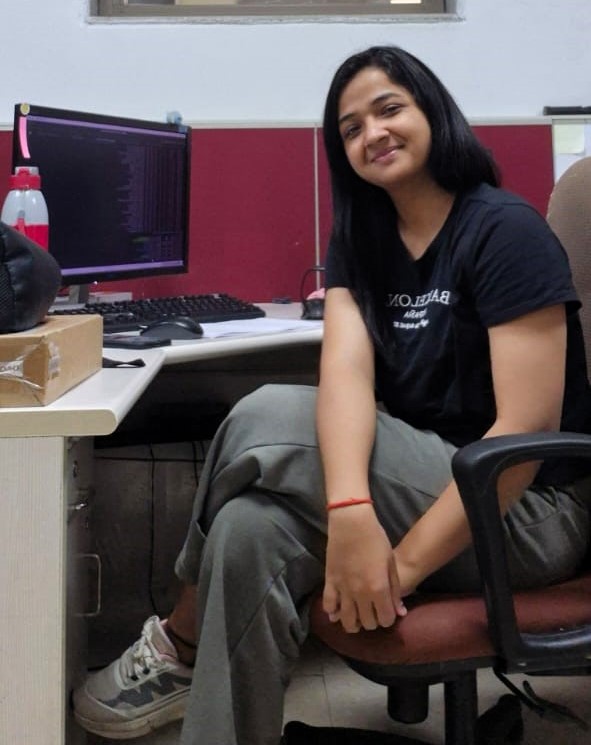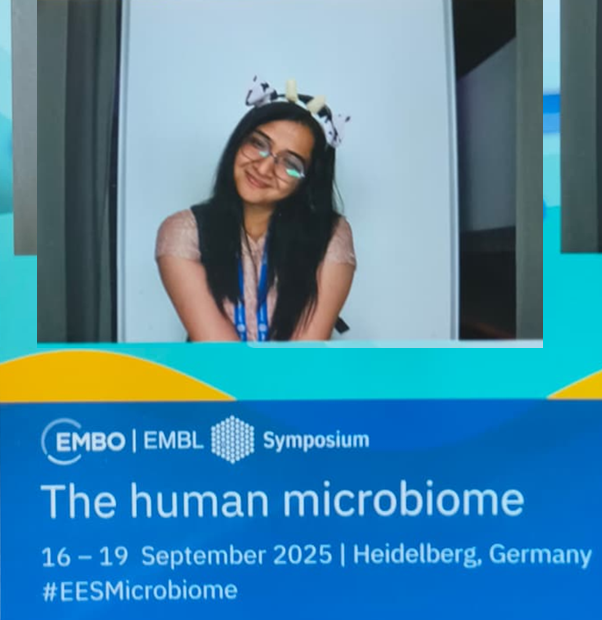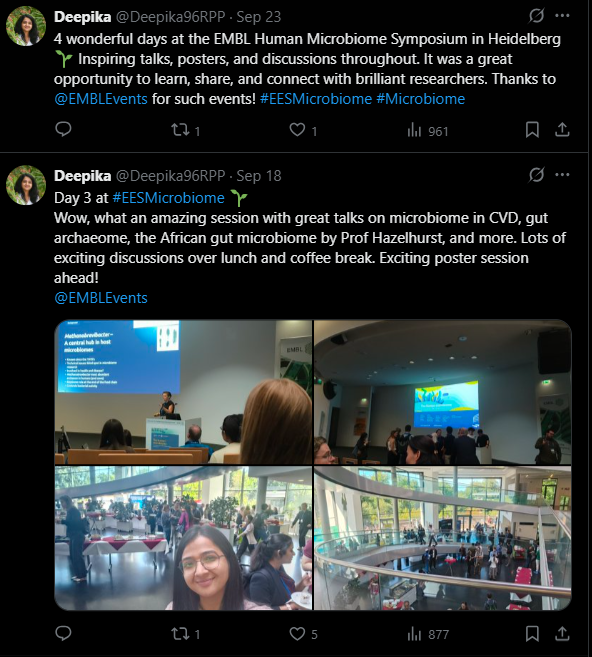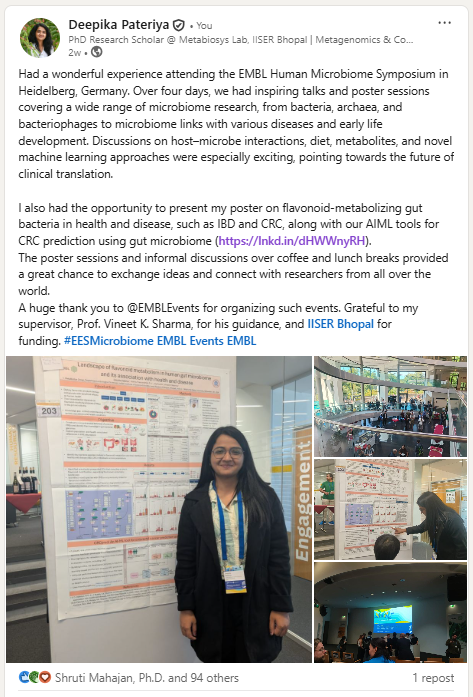Reflections from the EMBO|EMBL Symposium ‘The human microbiome’ by our event reporter, Deepika
Written by Deepika Pateriya, PhD student at the MetaBioSys Lab, Department of Biological Sciences, Indian Institute of Science Education and Research Bhopal, Bhopal, India

As a final-year PhD student working in the field of human microbiome research, attending the EMBO | EMBL Symposium ‘The human microbiome’ was an invaluable opportunity to present my work and engage with experts from around the world. This was my first in-person conference, and visiting Heidelberg for #EESMicrobiome made the experience truly memorable.
The symposium brought together leading scientists, researchers, and students to discuss the latest advances in microbiome science. I especially appreciated the diversity of topics covered — many talks introduced me to new perspectives and research areas I hadn’t explored before. The hybrid format, accommodating both on-site and virtual attendees, encouraged a dynamic exchange of ideas and facilitated easier connections with researchers from diverse backgrounds.
A big thank you to the organisers for curating such a well-coordinated event. It was both insightful and inspiring, and I look forward to participating in future #EESMicrobiome meetings.
I also had the opportunity to present my poster on my PhD research focused on Flavonoid Metabolism in the Human Gut Microbiome and the development of an AI–ML-based tool for colorectal cancer prediction. The poster sessions were highly interactive, and it was exciting to discuss my work with other participants who shared interests in microbial metabolism, computational biology, and microbiome-based disease prediction. The feedback I received was constructive and motivating, inspiring me to explore new directions and collaborative ideas for the future.
Inspiring science and discussions
The symposium covered a broad spectrum of themes — from microbial ecology and host–microbe interactions to translational and computational microbiome science. It was inspiring to see how deeply researchers are probing the complex relationship between the microbiome and human health using both experimental and computational approaches.
Highlights and takeaways from ‘The human microbiome’ symposium
The symposium provided a comprehensive overview of current progress in microbiome research, ranging from molecular insights to clinical applications. Here are a few major themes that stood out to me:
Uncovering microbial roles through experimental and computational synergy
Several talks emphasized how computational models and experimental validation now go hand in hand in microbiome research. Large-scale, longitudinal cohort studies are helping unravel how gut microbial communities vary across individuals and populations. At the same time, AI and machine learning approaches are transforming the field, enabling accurate disease classification, identifying microbiome-based biomarkers, and uncovering subtle associations that traditional analyses often overlook. This was particularly exciting for me as my own research involves building computational tools for microbiome-based disease prediction.
Understanding the infant microbiome and early-life development
Another inspiring topic was the development of the infant microbiome and its long-term implications for health. Talks highlighted how early microbial colonisation — particularly by Bifidobacterium species — plays a crucial role in immune and metabolic development. Researchers showed that maternal factors, diet, antibiotic exposure, and delivery mode shape microbial succession during the first 1,000 days of life. Additionally, early interactions between bacteria, viruses, and environmental factors lay the foundation for lifelong microbial balance. These insights highlight the lasting impact of early-life microbiome dynamics on human health.
Lifestyle, diet, and microbial diversity
Discussions also focused on how lifestyle and diet influence gut microbial ecology. Talks highlighted the contrasting dominance of Bacteroidaceae and Prevotellaceae in modern and traditional lifestyles, respectively — patterns that emerge from differences in dietary fibre availability and microbial interactions within the gut. Experimental work further illustrated how nutritional composition and microbial competition jointly determine which bacterial groups thrive, reflecting an ecosystem-level interplay between food and microbiota. An especially intriguing topic was how industrialization and urbanization are driving measurable microbial shifts and how industrialization may be a contributing force to the evolution of higher oxygen tolerance in the ancestral Segatella copri.
Experimental advances revealing disease connections
It was remarkable to see how innovative culture-based and metabolomics techniques are uncovering causal relationships between microbes and disease. Researchers demonstrated how precise experimental systems complement metagenomic findings, allowing for isolation and functional testing of microbes and metabolites involved in inflammation, metabolism, and immune regulation. This integration of computation and experiment represents a major step toward translating microbiome insights into therapeutic applications.
Building inclusivity and global collaborations
A recurring theme throughout the symposium was the importance of inclusivity and diversity in microbiome research. Talks emphasised community-based sample collection, participant data ownership, and transparent data-sharing practices. Such initiatives are vital to ensuring that microbiome science reflects global human diversity rather than being limited to specific populations, ultimately leading to more representative and equitable discoveries.
The spirit of Heidelberg and EMBL

After days filled with fascinating science and discussion, the personal interactions and the city’s charm added an entirely new dimension to the experience. Heidelberg’s timeless beauty, with its old castle, the Neckar River, and scenic bridges, provided a perfect backdrop for scientific exchange. The EMBL campus offered an inspiring setting for learning and collaboration, with every session thoughtfully curated and impeccably organised. I especially appreciated the inclusive atmosphere that brought together participants from diverse scientific and cultural backgrounds. Informal conversations over shared meals, coffee breaks, and poster sessions often led to meaningful professional connections and new ideas.
Overall reflections
Attending #EESMicrobiome was a truly transformative experience. It not only broadened my scientific perspective but also strengthened my motivation to integrate computational and experimental insights in my own research. The meeting reinforced the power of collaboration and multidisciplinary approaches in advancing microbiome science. I returned from Heidelberg with renewed enthusiasm, new ideas, and deep gratitude to the organisers for creating such an enriching and inspiring scientific gathering.


The EMBO | EMBL Symposium ‘The human microbiome’ took place between 16 – 19 September 2025 in Heidelberg, Germany, and virtually.
Read also about the #EESMicrobiome poster prize winners and find out more about their research in another blog post from the meeting.
Did you know that you can become an event reporter and receive a conference fee waiver in exchange? Find out how to do that by visiting our Become an event reporter page.